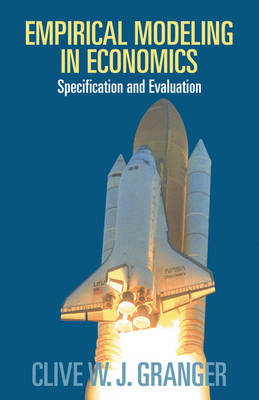
Empirical Modeling in Economics
Specification and Evaluation
Seiten
1999
Cambridge University Press (Verlag)
978-0-521-77825-1 (ISBN)
Cambridge University Press (Verlag)
978-0-521-77825-1 (ISBN)
Clive W. J. Granger is widely regarded as one of the greatest living social scientists. In this book, designed for scholars, researchers and senior undergraduates, he considers the process of constructing and evaluating an empirical model. Using case-studies from the arts and social sciences he provides a concise and entertaining account.
In these three essays, Professor Granger explains the process of constructing and evaluating an empirical model. Drawing on a wide range of cases and vignettes from economics, finance, politics and environment economics, as well as from art, literature, and the entertainment industry, Professor Granger combines rigour with intuition to provide a unique and entertaining insight into one of the most important subjects in modern economics. Chapter 1 deals with Specification. The process of specifying a model is discussed using deforestation in the Amazon region of Brazil as an illustration. Chapter 2 considers Evaluation, and argues that insufficent evaluation is undertaken by economists, and that models should be evaluated in terms of the quality of their output. In Chapter 3, the question of how to evaluate forecasts is considered at several levels of increasing depth and using a more sophisticated, technical approach than in the earlier two chapters.
In these three essays, Professor Granger explains the process of constructing and evaluating an empirical model. Drawing on a wide range of cases and vignettes from economics, finance, politics and environment economics, as well as from art, literature, and the entertainment industry, Professor Granger combines rigour with intuition to provide a unique and entertaining insight into one of the most important subjects in modern economics. Chapter 1 deals with Specification. The process of specifying a model is discussed using deforestation in the Amazon region of Brazil as an illustration. Chapter 2 considers Evaluation, and argues that insufficent evaluation is undertaken by economists, and that models should be evaluated in terms of the quality of their output. In Chapter 3, the question of how to evaluate forecasts is considered at several levels of increasing depth and using a more sophisticated, technical approach than in the earlier two chapters.
Winner of The Nobel Prize for Economics 2003.
Foreword G. Harcourt; 1. The specification of empirical models; 2. The evaluation of empirical models; 3. Comments on the evaluation of econometric models and of forecasts.
| Erscheint lt. Verlag | 30.9.1999 |
|---|---|
| Vorwort | Geoff Harcourt |
| Zusatzinfo | 2 Tables, unspecified |
| Verlagsort | Cambridge |
| Sprache | englisch |
| Maße | 140 x 216 mm |
| Gewicht | 170 g |
| Themenwelt | Wirtschaft ► Volkswirtschaftslehre ► Ökonometrie |
| ISBN-10 | 0-521-77825-5 / 0521778255 |
| ISBN-13 | 978-0-521-77825-1 / 9780521778251 |
| Zustand | Neuware |
| Haben Sie eine Frage zum Produkt? |
Mehr entdecken
aus dem Bereich
aus dem Bereich
Übungsaufgaben – Fallstudien – Lösungen
Buch | Softcover (2022)
De Gruyter Oldenbourg (Verlag)
CHF 34,90
mit Aufgaben, Klausuren und Lösungen
Buch | Softcover (2023)
UTB (Verlag)
CHF 34,85
Set aus Lehr- und Arbeitsbuch
Buch | Softcover (2022)
De Gruyter Oldenbourg (Verlag)
CHF 49,95


